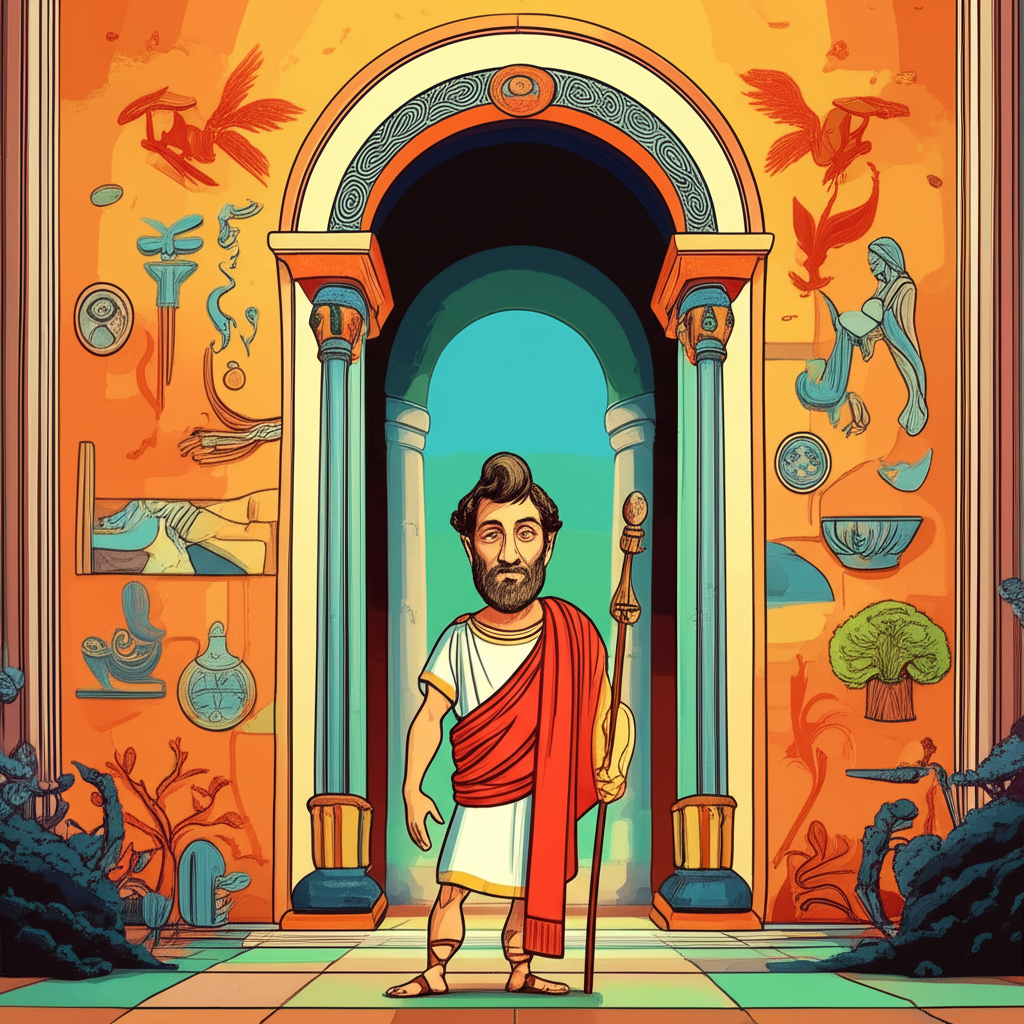
The grand tapestry of ancient Greek mythology is woven with threads of gods, heroes, and epic conflicts. Among these narratives, the story of the Trojan War stands as a monumental saga, a tale of love, loss, and the devastating consequences of pride. Within this sprawling epic, the goddess Aphrodite, a figure deeply ingrained in the cultural consciousness of ancient Greece, plays a pivotal, albeit often contentious, role. This is not a chronicle of historical events, but rather a traditional story, passed down through generations, reflecting the imaginative worldview of an ancient people.
The origins of these myths lie in the vibrant, polytheistic culture of ancient Greece, a civilization that flourished around the Aegean Sea for centuries. Imagine a world where the natural world was imbued with divine agency, where the rustling of leaves, the crashing of waves, and the very cycles of life and death were attributed to the will of powerful, anthropomorphic deities. The Greeks, living in city-states often separated by rugged terrain, developed rich oral traditions, where stories of the gods and their interactions with mortals served to explain the inexplicable, to impart moral lessons, and to foster a shared cultural identity. The Trojan War, as recounted in epic poems like Homer’s Iliad, emerged from this milieu, a period where the boundaries between the human and the divine were fluid, and where the actions of gods were understood to profoundly influence the mortal realm.
Central to the narrative of Aphrodite’s involvement in the Trojan War is the goddess herself. Aphrodite, in the ancient Greek pantheon, was primarily revered as the goddess of love, beauty, pleasure, and procreation. Her symbolic attributes were manifold: the dove, a symbol of peace and gentleness; the myrtle, a fragrant evergreen associated with love; and the rose, its delicate petals and intoxicating scent evoking sensuality and passion. She was often depicted as an impossibly beautiful woman, her presence capable of stirring intense desire and affection in mortals and immortals alike. In the context of the Trojan War, however, Aphrodite’s influence often manifested through her capacity to manipulate emotions and orchestrate events through the power of attraction and the allure of beauty, rather than through overt displays of divine might.
The journey that led to the Trojan War, and Aphrodite’s integral part in it, begins not with a clash of armies, but with a celestial banquet. The marriage of Peleus, a mortal hero, and the sea nymph Thetis was a grand affair, attended by gods and goddesses. However, Eris, the goddess of discord, was deliberately excluded. Spurned, she sought her revenge by casting a golden apple amongst the guests, inscribed with the words, "For the fairest." This seemingly simple act ignited a furious dispute among the three most powerful goddesses: Hera, queen of the gods and wife of Zeus; Athena, goddess of wisdom and warfare; and Aphrodite, goddess of love.
Each goddess believed herself to be the rightful recipient of the apple. Zeus, wisely unwilling to judge among his wife and his powerful daughters, decreed that the decision should fall to a mortal – Paris, a prince of Troy, then living as a shepherd. The goddesses appeared before Paris, each offering him a bribe in exchange for the apple. Hera promised him dominion over Asia. Athena offered him wisdom and victory in battle. Aphrodite, however, whispered a far more personal and alluring temptation: the love of the most beautiful woman in the world.
Paris, swayed by the goddess’s promise and perhaps by her own divine beauty, awarded the golden apple to Aphrodite. This judgment, driven by the allure of romantic love, set in motion a chain of events that would ultimately engulf Troy in war. The most beautiful woman in the world, as promised by Aphrodite, was Helen, wife of Menelaus, king of Sparta. Under Aphrodite’s guidance, Paris journeyed to Sparta, and through a potent blend of Aphrodite’s charm and Paris’s own allure, Helen was persuaded – or perhaps magically compelled – to abandon her husband and her home and flee with Paris to Troy.
This act of abduction, orchestrated by Aphrodite’s intervention, was perceived by the Achaeans (Greeks) as an unforgivable insult and a violation of hospitality. The offended Achaean kings, bound by oaths of mutual support, rallied their forces. Thus, the legendary ten-year siege of Troy commenced, a conflict fueled by a dispute over beauty and love, a dispute where Aphrodite’s choice played a direct and catastrophic role.
Throughout the war, Aphrodite continued to champion the Trojan cause, particularly her son Aeneas, a Trojan prince. She would often appear on the battlefield, shielding her favored warriors from harm, instilling courage, and sometimes directly intervening to save them from certain death. Her presence, while not always directly leading to victory for the Trojans, served to prolong the conflict and underscore the personal stakes involved for the gods. Her motives were deeply tied to her domain: she sought to protect the lineage of her son and to see her promise to Paris fulfilled, even as it led to immense suffering.
The symbolism of Aphrodite in this narrative is multifaceted. For the ancient Greeks, she represented the undeniable power of love and desire, forces that could inspire great acts of heroism but also lead to folly and destruction. The golden apple itself became a potent symbol of irresistible temptation and the dangerous consequences of choosing personal gratification over duty or societal harmony. Aphrodite’s involvement highlighted the ancient Greek understanding of the world as one where mortal affairs were intrinsically linked to the whims and desires of the gods, where the pursuit of beauty and love, while fundamental to life, could also be a catalyst for immense tragedy. Her actions, in this context, might have been seen as a cautionary tale about the unchecked power of passion and the potential for divine intervention to disrupt the established order, leading to profound societal upheaval.
In modern interpretations, the myth of Aphrodite and the Trojan War continues to resonate. In literature, she is often portrayed as a complex figure, not purely benevolent, but a force of nature whose passions have far-reaching consequences. In films and television, her beauty is frequently emphasized, but her role as a manipulator and instigator of conflict is also explored. In video games and popular culture, she might be depicted as a powerful goddess whose favor is sought, or whose wrath is to be avoided. Academically, scholars analyze these myths for insights into ancient Greek values, their understanding of human nature, and the role of storytelling in shaping their collective identity.
Ultimately, the tale of Aphrodite and the Trojan War serves as a powerful reminder of the enduring human fascination with stories that explore the complexities of love, beauty, and conflict. It is a testament to the rich cultural heritage of ancient Greece, a world where imagination and belief were intertwined, shaping narratives that continue to captivate us. As Muslims, we recognize that only Allah, the Almighty Creator and Sustainer, possesses true divine power and knowledge. These ancient stories, while culturally significant and artistically profound, are understood within their historical and mythological context, as expressions of human understanding and imagination in a bygone era, contributing to our appreciation of the diverse tapestry of human cultural heritage and the timeless art of storytelling.




